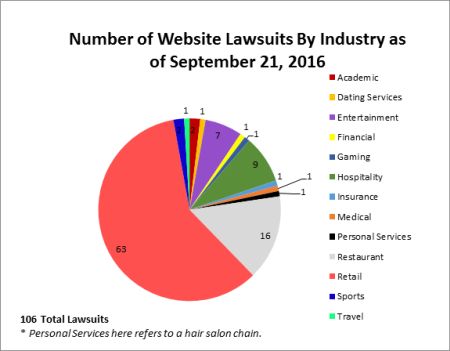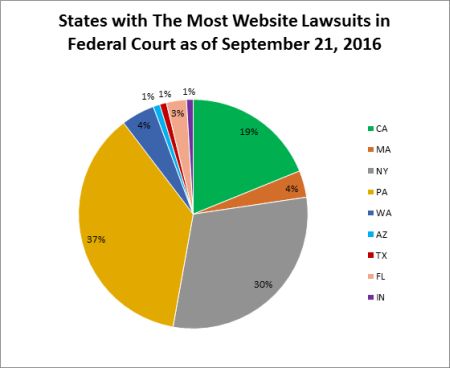Seyfarth Synopsis: The number of federal lawsuits alleging inaccessible websites continues to increase, along with the number of law firms filing them. Businesses need advice now on how to manage risk in this chaotic environment.
As we predicted, website accessibility lawsuits and threatened claims have become big business for some aspects of the plaintiffs' bar. More law firms are filing lawsuits or sending demand letters alleging individuals with disabilities are denied access to a business's goods and services due to inaccessible websites than ever. The number of lawsuits filed in federal court since the beginning of 2015 has surged to 106 as of September 21, 2016. Retailers have been the most popular targets, followed by restaurant and hospitality companies.

(The above pie chart shows the following number of lawsuits by industry: Academic-1; Dating Services-1; Entertainment-7; Financial-1; Gaming-1; Hospitality-9; Insurance-1; Medical-1; Personal Services-1; Restaurant-16; Retail-63; Sports-2; Travel-1)
We analyzed the data to find that five firms dominate the space, but we have seen more and more attempting to get in on the action as well.

(The above pie chart shows the following percentages of lawsuits filed by law firm: Block Leviton-2%; Carlson Lynch-45%; Lee Litigation Group-30%; Newport Trial Group-17%; Roger Borg Law Offices-2%; Other-10%)
Pennsylvania, New York, and California federal courts have more than 85% of the lawsuits at this point, but, with three months left in the year, that could change.

(The above pie chart shows the following percentages of lawsuits per state: CA-19%; MA-4%; NY-30%; PA-37%; WA-4%; AZ-1%; TX-1%; FL-3%; IN-1%)
We have previously reported that several law firms representing unnamed clients with disabilities had sent out hundreds of demand letters to various types of businesses concerning their allegedly inaccessible websites. From what we can tell, very few of those demand letters went to financial services institutions. We have learned that the most recent batch of demand letters is focused on the websites of community banks around the country.
Meanwhile, we still have no proposed regulations for public accommodations websites from the DOJ and a change in administration could derail or delay the rulemaking process further. Thus, the need is no less urgent for businesses to come up with a plan to mitigate their litigation exposure in this tumultuous environment.
The content of this article is intended to provide a general guide to the subject matter. Specialist advice should be sought about your specific circumstances.

